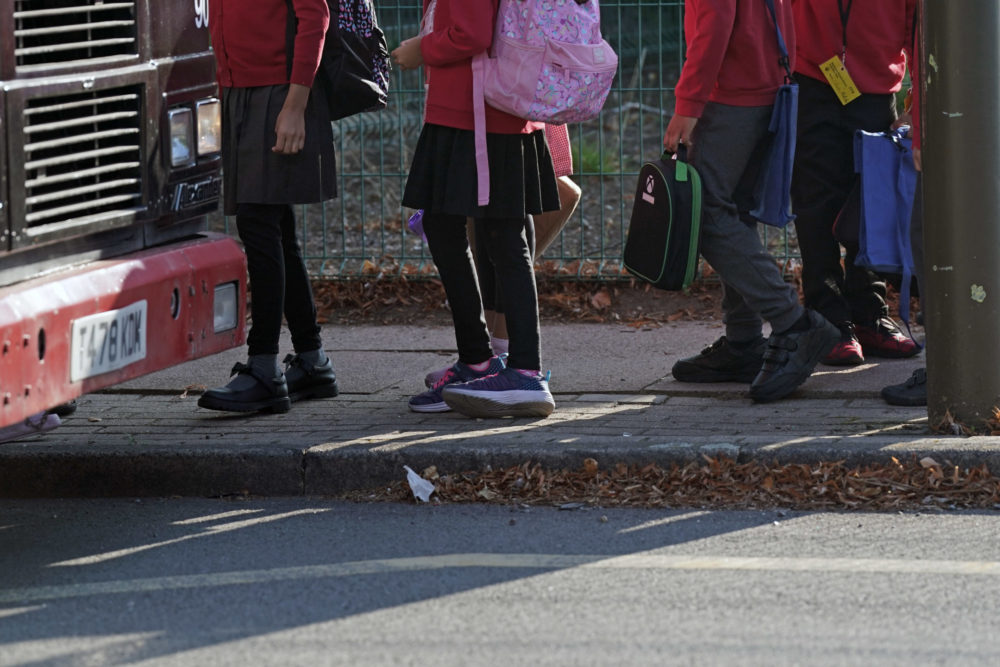Cash-strapped council cuts school transport payments

Richard Evans, local democracy reporter
A cash-strapped council will cease paying discretionary fees for home-to-school transport for some children as part of cost-cutting measures.
At a meeting of Conwy council’s cabinet on Tuesday (23 July) members backed plans to cease making some discretionary payments to transport pupils to and from school in a bid to cut its £7.5m annual home-to-school transport bill.
Councillors heard how the authority faces a £32.3m funding shortfall in 2025/26.
But under the newly agreed policy, payments funding the transportation of children to Welsh medium schools over the statutory distance, when it is not the nearest school, will remain – as will payments for the transport of gypsy and Roma traveller children (within the statutory distance).
Change address
The council will also save £25,000 by removing discretionary payments to transport pupils who change address during their exam years (so they can remain at the same school).
Perhaps most controversially, an additional £48,000 will be saved by requesting evidence of faith for transporting children to denominational schools.
Payments to transport children with separated parents will be restricted to journeys within Conwy county.
Pupils aged 16 and over travelling over the statutory distance will now be provided transport to the nearest secondary school (or Welsh medium school, or college over the statutory distance).
Transport for pupils with medical conditions or additional learning needs (ALN) will continue to be individually assessed but with added resources to conduct annual reviews.
The changes are set to be implemented in September 2025.
Savings
The council plans to monitor savings but currently spends £4.605m annually on discretionary home-to-school transport costs.
The review follows a public consultation answered by 1,000 people.
Speaking at a special cabinet meeting at Bodlondeb, cabinet member for education Cllr Julie Fallon said: “I think it is really important that we need to implement things that we can do, and this is achievable where we stand currently, and hopefully increasing capacity within the department means we look at all of discretionary transport whether that’s people who are just coming along to look at the offer of discretionary transport and where possible that we encourage families and young people to make that independent travel and to use facilities that are already available, whether that is public transport or making their own way to schools.”
Precarious
She added: “Any money that comes from this budget comes from the council’s wider budget, which is in a very precarious position.”
Deputy leader Cllr Emily Owen added: “It is a really sensitive one this. It is always difficult when we’ve been given things in the past and we are looking to change them.”
Cllr Aaron Wynne commented: “It is a challenging time for us as a council, and we have to look at everything.”
Cllr Wynn then seconded the recommendation put forward by Cllr Fallon.
The changes follow Conwy cutting 5% from school budgets for the last two years running – leading to 51 job losses in education.
The cabinet changes to the policy are as follows:
Transport to Welsh medium schools over the statutory distance when not the nearest school – Retain
Transport for learners who change address during the exam years of their education so that they can remain at the same school – Remove and potentially save £25,000
Transport to denominational schools over the statutory distance – Amend so that evidence of faith can be requested and potentially save £48,000
Transport for Gypsy Roma Traveller children within the statutory distance – Retain
Provision of transport to two residences where parents live separately – Amend – restricted to transport within Conwy County Borough.
Post 16 transport over the statutory distance – Amend to provide post 16 transport to the nearest educational establishment (the nearest or catchment secondary school / Welsh medium school or to the nearest F.E. college) over the statutory distance
Transport for pupils with medical conditions or additional learning needs (ALN) – Review transport provision in line with existing policy
School transport for other/specific reasons– Review transport provision in line with existing policy
Support our Nation today
For the price of a cup of coffee a month you can help us create an independent, not-for-profit, national news service for the people of Wales, by the people of Wales.





Councils need to seriously look at inhouse cutbacks and six-figure wages before cutting public services. Why does it take six or seven council workers to do the job of two? Why does every one of these workers turn up on site in seperate vehicles? Why do council workers get free parking when the general working public have to pay? Long-term council staff sickness on full pay. Pensions. The list goes on.
Why pick on the front line services workforce, they only work to what’s on their work dockets on any given day, try looking at the numbers of the faceless ones on the executive councils & the wages they are pulling in, ’twill make your eyes water.
If you read the first two lines of my comment you will see that I have mentioned six-figure salaried workers. I don’t call them “executives” because they couldn’t make one competent executive out of the whole bunch.
Can you evidence that every job undertaken by a council requires six or seven workers when just two from the private sector can do it? Or is it just an exaggeration to try to make a point?
Welsh Government: Conwy needs to be placed in special measures, urgently!
Never mind though, Charlie is having two brand new helicopters this year plus a new fleet of cars, I expect one of those will only be brought out to carry the crown back & fore parliament. Meanwhile the kids can walk back & fore to school. All in this together my backside.